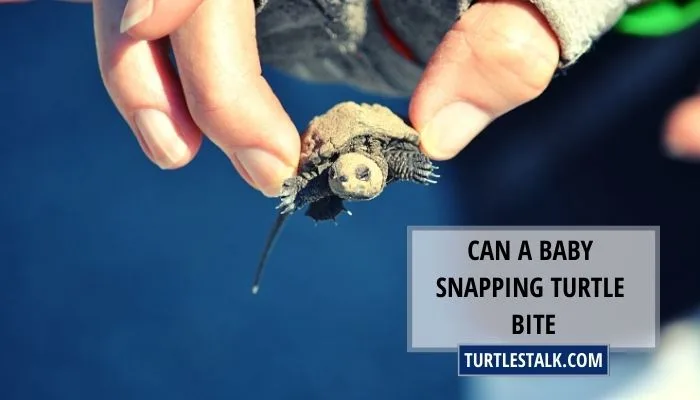Tiny But Mighty: Can a Baby Snapping Turtle Bite?
Babies are typically associated with being cute and harmless; however, this may not be the case when it comes to baby snapping turtles. Although not as powerful and experienced as their adult counterparts, baby snapping turtles can still deliver a nasty bite.
They have sharp beaks and strong jaws capable of inflicting a painful bite. They are also more likely to bite than adult turtles because they are more easily threatened. If you mishandle a baby snapping turtle, it can bite you which is one of their primary defense mechanisms.
In this article, we will explore the biting behavior of baby snapping turtles and provide some insights on how to handle them safely. Read on to discover the truth about baby snapping turtles and their biting tendencies.
Is a Baby Snapping Turtle Capable of Biting?
A baby snapping turtle is indeed capable of biting. As with adult turtles, they have powerful jaws and sharp beaks that they can use to bite if they feel threatened or defensive.
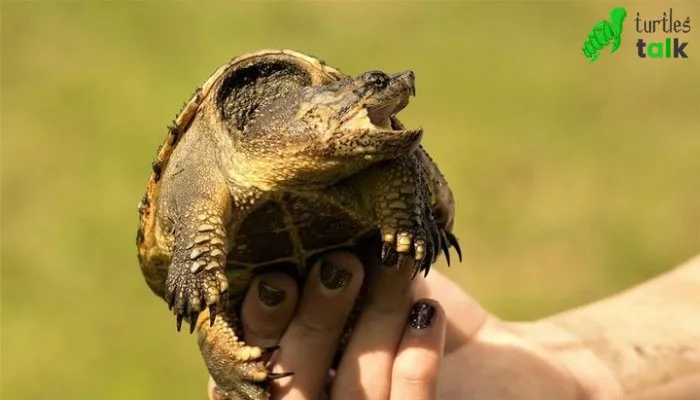
Baby turtles are known to have a more delicate structure than adult turtles, their jaw is not as powerful as adults, but the beak is sharp and can cause pain if they bite. They also have relatively small heads, making them appear less intimidating, but it is important to remember that they can still deliver a painful bite.
Remember that biting is a defense mechanism for snapping turtles, and they will only bite if they feel threatened or are being mishandled.
How Hard a Baby Snapping Turtle Bite?
A baby snapping turtle’s bite force is measured at over 41.1 pounds—that’s pretty substantial for a baby animal. As the most common species of freshwater turtle in North America, the baby snapping turtle is known for its aggressive and protective nature—but it’s not just for defense.
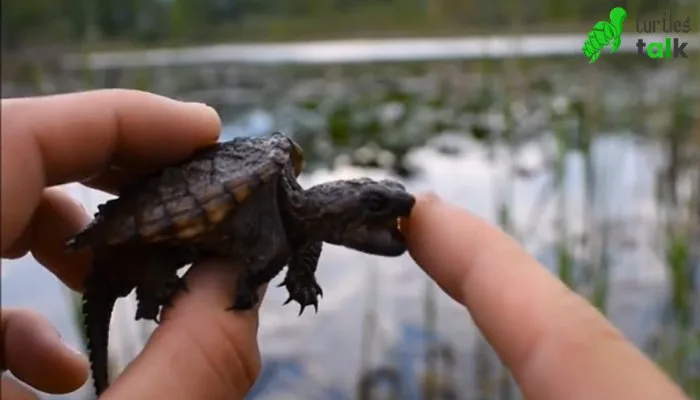
The species is known for its voracious appetite and its ability to hunt prey much larger than itself. It’s also important to note that even though the snapping turtle is herbivorous as an adult, it’s important for baby snapping turtles to have a varied diet, including insects and crustaceans.
Their bite force is impressive considering their small size—snapping turtles are the only species of turtle that cannot be contained within a standard aquarium tank due to their sizes and natural behaviors.
Can You Pick Up Baby Snapping Turtles?
You can pick up baby snapping turtles, but it is important to do so safely and responsibly. When picking up this baby turtle, it is important to support the entire body, including the legs and tail.
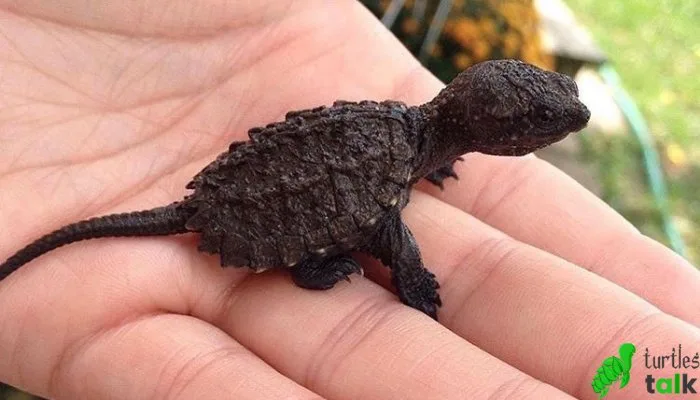
This will prevent the turtle from feeling threatened and reduce the chance of a bite. Also, you should avoid picking them up by the tail, as it can cause injury to the turtle.
It is also important to be aware of the turtle’s environment and to keep their natural habitat in mind. If you find a baby snapping turtle in the wild, it is best to leave it alone and not to disturb it.
If you are considering taking a baby snapping turtle as a pet, make sure that you understand the requirements for keeping the turtle healthy and happy, such as proper diet, habitat, and temperature.
How to Handle a Baby Snapping Turtle?
Handling a baby snapping turtle can be a challenging experience for those who are unfamiliar with the species. Remember that these turtles are wild animals and are prone to biting if they feel threatened. Therefore, it is crucial to handle them in the gentlest manner possible.
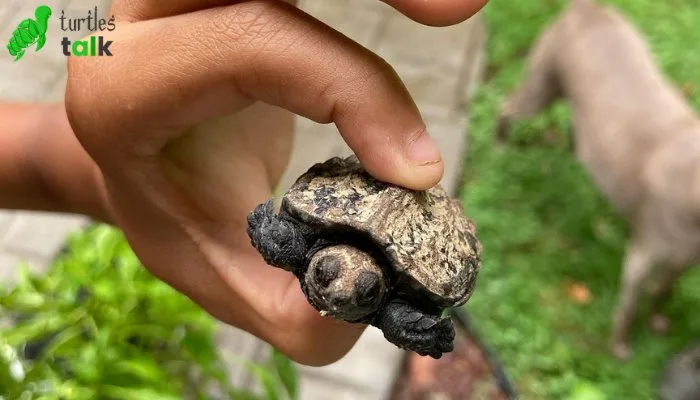
Provide a Large, Clean Aquarium
Baby snapping turtles—or any baby turtle, for that matter—do best in a large, clean aquarium. The water should be kept at a consistent temperature, ideally around 76 degrees Fahrenheit. You’ll also need to regularly change the water and clean the tank.
Provide a Variety of Foods
These turtles are omnivores, meaning they eat both plants and animals. Offer them a variety of foods—such as fish, worms, shrimp, and crickets—in addition to the plants and vegetables you’ll be feeding them in their tank.
Be Gentle When Handling Them
When handling a baby turtle, be gentle. They can be skittish and may try to bite you. Use two hands when picking them up—one to support their body and one to hold their head—and avoid any sudden movements or loud noises.
Handle Them Frequently
The more you handle this baby turtle, the more comfortable it will become with being handled. Start by handling them for short periods of time every day and gradually increase the duration. It’s also important to handle them often so they don’t mistake your presence in their tank for food.
Handle Them Regularly
Once your baby turtle becomes comfortable with being handled, you can start to handle them regularly. This will help them get used to being picked up—and will make it easier for you to clean their tank and provide them with food.
Can a Baby Snapping Turtle Hurt You?
A baby snapping turtle can hurt you—though it’s highly unlikely. These baby turtles may not bite you with their small mouths, but they can still scratch you with their sharp claws.
However, you can significantly reduce your chances of getting hurt by handling a snapping turtle—or any reptile—with care. Always wear thick gloves when handling them and keep them in a secure space.
Also, never stick your hand into the tank of water the turtle is in; they may bite at any time. Be sure to let a professional handle any problems that arise with your snapping turtle.
Can a Baby Snapping Turtle Bite Your Finger Off?
It is highly unlikely that a baby snapping turtle would be able to bite your finger off. Baby turtles, like adult snapping turtles, have strong jaws and sharp beaks, but they are not powerful enough to bite off a finger.
They are capable of inflicting a painful bite, but they are not known to be aggressive animals and generally only bite as a defense mechanism if they feel threatened.
Remember that baby snapping turtles are not as powerful as adult snapping turtles, their jaw muscles are not fully developed, and their beak is not as sharp. They are not able to exert the same level of force as an adult turtle, so it is very unlikely that they will be able to bite off a finger.
However, it’s worth noting that their bite can still be painful and cause injury, and it’s important to handle them carefully and avoid handling them in ways that may cause them to bite. It’s also important to keep them in an appropriate enclosure with a proper diet and environment.
What to Do if Your Baby Snapping Turtle Bites You?
If your baby snapping turtle bites you—it will most likely not break the skin, and if it does—it won’t cause any serious injuries.
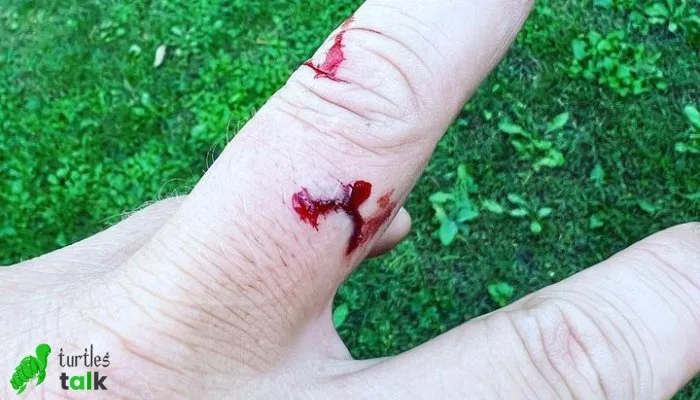
Just keep your calm. Don’t force the turtle to leave as it will frighten it more; as a result, it will bite you harder. Wait for your pet to leave the bite. Try dipping your hand in the water. This way, your turtle can escape.
Once it leaves your hand, wash the area with soap and water, and apply a small bandage to prevent infection. Since they have no teeth, the bite will most likely feel like a pinch or scratch from their strong beak.
To prevent your turtle from biting, ensure always have an appropriate habitat for their needs and always handle them carefully—when they are out of the water.
How to Stop a Baby Snapping Turtle From Biting?
The best way to stop a baby snapping turtle from biting is never to hold the little guy in the first place. This baby turtle will likely bite if it feels threatened or scared in any way.
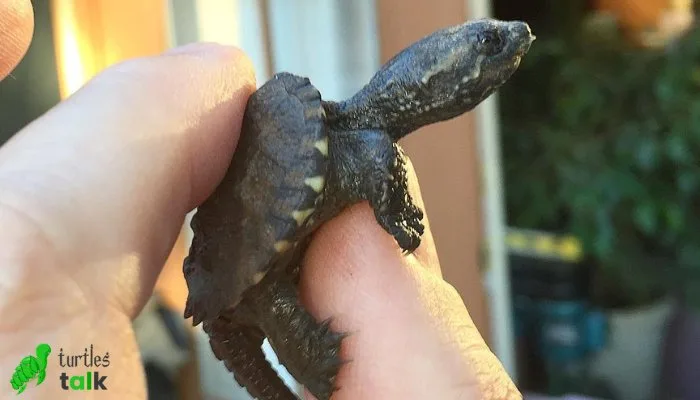
Here are a few ways to stop a baby snapping turtle from biting:
Handle the turtle gently and carefully
When handling a baby snapping, it is important to support its entire body, including the legs and tail. Avoid picking it up by the tail, as this can cause injury and distress, which may lead to a bite.
Provide a proper environment
Ensure the turtle has a suitable habitat that includes a warm and humid environment, appropriate food and water, and a basking spot. These elements will help the turtle feel safe and secure, which may reduce the likelihood of biting.
Avoid handling when hungry or stressed
These turtles may be more likely to bite when they are hungry or stressed, so it is best to avoid handling them during these times.
Train the turtle
Gradually introduce the turtle to your hand, and give it food from your hand, this can help the turtle to associate your hand with food, rather than a threat.
Supervise children around the turtle
Children should be supervised when they are around the turtle to ensure that they are handling it gently and appropriately.
Keep them healthy
Make sure the turtle is in good health, well-nourished and hydrated, as a turtle in poor health is more prone to biting.
What to Do if Your Baby Snapping Turtle Won’t Stop Biting?
If you’re having a hard time getting your baby snapping turtle to stop biting, it might be because they are just too excited. In this case, it’s best to just leave them alone for a little while. This will give them time to calm down and become less aggressive.
If your turtle is biting but not snapping at you, you can try using a stick or spoon to gently block its mouth from attacking you. Be sure to use a thick cloth—such as an old t-shirt—to protect your hands from sharp beaks.
If your baby turtle continues to bite despite these efforts, it may be time to reevaluate whether or not they are the right fit for your home. Some species of snapping turtles can be more aggressive than others and determining whether or not your turtle is one of them should be your top priority.
Can Snapping Turtles Bite Hard Even When They’re Babies?
Can snapping turtles bite hard even when they’re babies? snapping turtle breath-holding facts reveal that even as hatchlings, these turtles have strong jaws capable of delivering a powerful bite. Their sharp beaks, combined with strong neck muscles, allow baby snapping turtles to deliver a significant bite force.
Conclusion
You should be careful when handling a baby snapping turtle. They may look cute and harmless, but remember that they are wild animals that should not be touched or handled without the proper precautions.
You should avoid letting it bite you. If you get bitten by them, you should keep calm and seek medical attention. You also shouldn’t release a baby snapping into the wild. You should make ensure proper care of the baby turtle.

